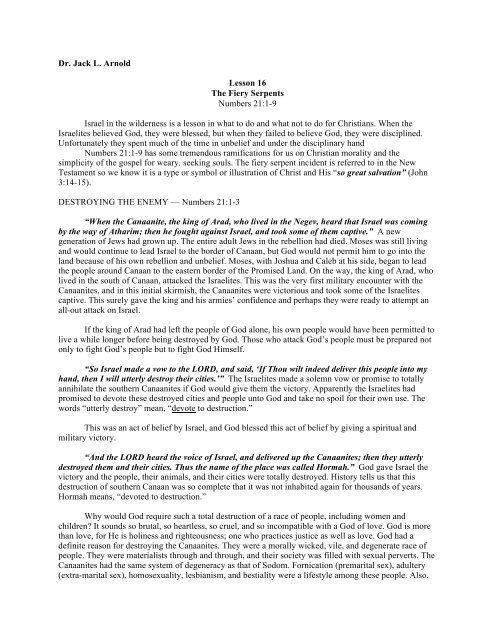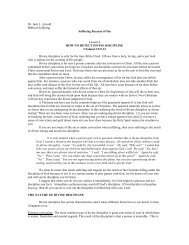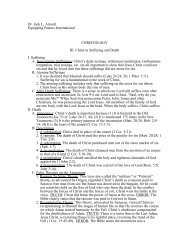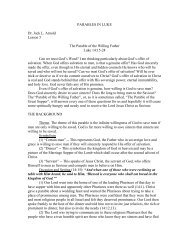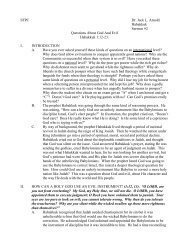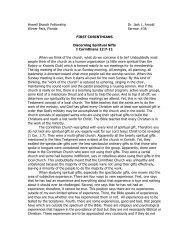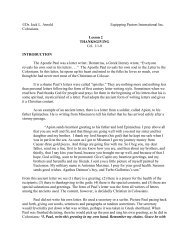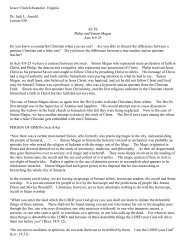Dr. Jack L. Arnold Lesson 16 The Fiery Serpents Numbers 21:1-9 ...
Dr. Jack L. Arnold Lesson 16 The Fiery Serpents Numbers 21:1-9 ...
Dr. Jack L. Arnold Lesson 16 The Fiery Serpents Numbers 21:1-9 ...
Create successful ePaper yourself
Turn your PDF publications into a flip-book with our unique Google optimized e-Paper software.
<strong>Dr</strong>. <strong>Jack</strong> L. <strong>Arnold</strong><br />
<strong>Lesson</strong> <strong>16</strong><br />
<strong>The</strong> <strong>Fiery</strong> <strong>Serpents</strong><br />
<strong>Numbers</strong> <strong>21</strong>:1-9<br />
Israel in the wilderness is a lesson in what to do and what not to do for Christians. When the<br />
Israelites believed God, they were blessed, but when they failed to believe God, they were disciplined.<br />
Unfortunately they spent much of the time in unbelief and under the disciplinary hand<br />
<strong>Numbers</strong> <strong>21</strong>:1-9 has some tremendous ramifications for us on Christian morality and the<br />
simplicity of the gospel for weary, seeking souls. <strong>The</strong> fiery serpent incident is referred to in the New<br />
Testament so we know it is a type or symbol or illustration of Christ and His “so great salvation” (John<br />
3:14-15).<br />
DESTROYING THE ENEMY — <strong>Numbers</strong> <strong>21</strong>:1-3<br />
“When the Canaanite, the king of Arad, who lived in the Negev, heard that Israel was coming<br />
by the way of Atharim; then he fought against Israel, and took some of them captive.” A new<br />
generation of Jews had grown up. <strong>The</strong> entire adult Jews in the rebellion had died. Moses was still living<br />
and would continue to lead Israel to the border of Canaan, but God would not permit him to go into the<br />
land because of his own rebellion and unbelief. Moses, with Joshua and Caleb at his side, began to lead<br />
the people around Canaan to the eastern border of the Promised Land. On the way, the king of Arad, who<br />
lived in the south of Canaan, attacked the Israelites. This was the very first military encounter with the<br />
Canaanites, and in this initial skirmish, the Canaanites were victorious and took some of the Israelites<br />
captive. This surely gave the king and his armies’ confidence and perhaps they were ready to attempt an<br />
all-out attack on Israel.<br />
If the king of Arad had left the people of God alone, his own people would have been permitted to<br />
live a while longer before being destroyed by God. Those who attack God’s people must be prepared not<br />
only to fight God’s people but to fight God Himself.<br />
“So Israel made a vow to the LORD, and said, ‘If Thou wilt indeed deliver this people into my<br />
hand, then I will utterly destroy their cities.’” <strong>The</strong> Israelites made a solemn vow or promise to totally<br />
annihilate the southern Canaanites if God would give them the victory. Apparently the Israelites had<br />
promised to devote these destroyed cities and people unto God and take no spoil for their own use. <strong>The</strong><br />
words “utterly destroy” mean, “devote to destruction.”<br />
This was an act of belief by Israel, and God blessed this act of belief by giving a spiritual and<br />
military victory.<br />
“And the LORD heard the voice of Israel, and delivered up the Canaanites; then they utterly<br />
destroyed them and their cities. Thus the name of the place was called Hormah.” God gave Israel the<br />
victory and the people, their animals, and their cities were totally destroyed. History tells us that this<br />
destruction of southern Canaan was so complete that it was not inhabited again for thousands of years.<br />
Hormah means, “devoted to destruction.”<br />
Why would God require such a total destruction of a race of people, including women and<br />
children? It sounds so brutal, so heartless, so cruel, and so incompatible with a God of love. God is more<br />
than love, for He is holiness and righteousness; one who practices justice as well as love. God had a<br />
definite reason for destroying the Canaanites. <strong>The</strong>y were a morally wicked, vile, and degenerate race of<br />
people. <strong>The</strong>y were materialists through and through, and their society was filled with sexual perverts. <strong>The</strong><br />
Canaanites had the same system of degeneracy as that of Sodom. Fornication (premarital sex), adultery<br />
(extra-marital sex), homosexuality, lesbianism, and bestiality were a lifestyle among these people. Also,
they had a very low concept of human life and child sacrifice was a basic part of their society. All this<br />
immorality was done in the name of religion. It was practiced as part of their concept of god. Of course,<br />
their god was the Devil as he disguised himself in the god Baal. This race was so wicked that God had to<br />
destroy it for the protection and preservation of the human race. Whenever a race of people, a nation, or<br />
an individual begins to violate God’s moral law and deprecate God’s divine institutions (government,<br />
marriage, work, etc.), there will be judgment. One of the best things that ever happened to the human race<br />
was the destruction of the Canaanites.<br />
<strong>The</strong> destruction of the Canaanites may help us to understand that homosexuality is something<br />
learned and not inherited. <strong>The</strong> Canaanites were descendents of the white sons of Ham. Apparently Ham<br />
and Canaan (his grandson) were homosexuals (Gen. 9:18-27). <strong>The</strong>se traits were accepted and taught to a<br />
whole nation as a legitimate lifestyle. Why? <strong>The</strong>y rejected God and His moral law; therefore judgment<br />
would come upon them.<br />
DISTRUSTING GOD - <strong>Numbers</strong> <strong>21</strong>:4-5<br />
“<strong>The</strong>n they set out from Mount Hor by the way of the Red Sea, to go around the land of Edom; .<br />
. .” Moses now led this new generation around Edom and away from Canaan, the Promised Land. <strong>The</strong><br />
Edomites had specifically commanded the Israelites not to go through Edom (Num. 20:20, <strong>21</strong>). Why did<br />
not Israel fight the Edomites? Because they were relatives through Esau even though they were<br />
unbelievers.<br />
“…And the people became impatient because of the journey.” <strong>The</strong> people knew they had<br />
turned southward, moving back out into the desert, towards the Red Sea and their backs were to the<br />
Promised Land. <strong>The</strong>y had limited supplies of water in a hot, dry desert, and they were bored with manna.<br />
<strong>The</strong>y grew impatient and there was no contentment in their souls, so they began to gripe, complain, moan,<br />
and groan in unbelief of God’s ability to meet their every need.<br />
All Christians must learn to exercise patience, for without it they may well become negative<br />
Christians. One of the fruits of the Spirit is patience. “But the fruit of the Spirit is love, joy, peace,<br />
patience, kindness, goodness, faithfulness, gentleness, self-control; against such things there is no<br />
law” (Gal 5:22-23).<br />
Sometimes God works out circumstances so it looks like we are going backwards in our Christian<br />
lives, but this is just a test so we will believe God and go forward. Sometimes we have to take two steps<br />
backward in order to go three steps forward.<br />
“And the people spoke against God and Moses, ‘Why have you brought us up out of Egypt to<br />
die in the wilderness? For there is no food and no water…’” Everything was out of perspective for<br />
these Jews because they were personally out of fellowship with God. God was not going to kill them, but<br />
He intended to bless them by taking them into the Promised Land. Furthermore, there was bread, for they<br />
had manna, but they were not satisfied with this heavenly bread. When they got out of fellowship they<br />
blamed God and Moses for their problems.<br />
“…And we loathe this miserable food.” Manna was from heaven; it was angel’s food. It was the<br />
best bread ever given to man, full of rich vitamins and minerals, and it had a luscious taste. Yet they<br />
called this “light bread” unfit for human consumption. <strong>The</strong>y were discontent with God’s lot for their lives.<br />
Discontentment makes us unhappy with anything and everything because our souls are not at rest with<br />
God’s will for our lives. Discontentment is due to unbelief in God’s sovereign will for one’s life, and God<br />
hates unbelief.<br />
DISCIPLINE OF THE PEOPLE — <strong>Numbers</strong> <strong>21</strong>:6-9
“And the LORD sent fiery serpents among the people and they bit the people, so that many<br />
people of Israel died.” For their unbelief, griping, complaining and discontent, God brought Israel divine<br />
discipline. He disciplined them with physical death for their sin. This is called in the New Testament “the<br />
sin unto death” where a true believer loses his physical life because of sin but still is saved.<br />
“If any one sees his brother committing a sin not leading to death, he shall ask and God<br />
will for him give life to those who commit sin not leading to death. <strong>The</strong>re is a sin leading to<br />
death; I do not say that he should make request for this. All unrighteousness is sin, and there is<br />
a sin not leading to death” (1 John 5:<strong>16</strong>-17).<br />
<strong>The</strong> means God used to bring about this discipline was fiery serpents. God brought multitudes of<br />
snakes into the camp of Israel, <strong>The</strong>y are called fiery serpents because they were venomous snakes or<br />
because of the fiery red color of the snakes. We know that the Arabia even today does produce a<br />
poisonous viper with red spots arid wavy stripes. This was a horrible kind of discipline to be bitten by<br />
venomous vipers and to find a snake everywhere one turned. Sometimes God must use drastic discipline<br />
to get our attention.<br />
“So the people came to Moses and said, ‘We have sinned, because we have spoken against the<br />
LORD and you; intercede with the LORD, that He may remove the serpents from us.’ And Moses<br />
interceded for the people.” Under the rod of God, the sons of Israel relented and repented. Unlike their<br />
fathers, this new generation was not so hardhearted and they truly saw that they had sinned against God<br />
and Moses, and they asked for forgiveness. This was true repentance because they saw clearly that they<br />
had sinned against Jehovah, their covenant God, and against His moral law. Sin will never be truly<br />
repented of until we see that sin is against God alone. “Against <strong>The</strong>e, <strong>The</strong>e only, I have sinned, and<br />
done what is evil in Thy sight…” (Psalm 51:4a).<br />
We see also that when in trouble the people saw their need of Moses even though just a short<br />
while before they were complaining about him. Leadership, when doing a good job, is rarely appreciated.<br />
“<strong>The</strong>n the LORD said to Moses, ‘Make a fiery serpent, and set it on a standard; and it shall<br />
come about, that everyone who is bitten, when he looks at it, he shall live.’ And Moses made a bronze<br />
serpent and set it on the standard, and it came about, that if a serpent bit any man, when he looked to<br />
the bronze serpent, he lived.” <strong>The</strong> moment the Israelites were truly repentant for their sins, God made a<br />
wonderful provision for them. He commanded Moses to make a bronze snake and place it up on a pole.<br />
Anyone who was bitten by a snake would be healed if he looked at the bronze serpent. This most<br />
assuredly was a miraculous cure. However, the healing power was not in the bronze serpent but in the<br />
power of God and the bronze serpent was just a means to the end. <strong>The</strong> Jews in their interpretation of this<br />
passage say that it was not the sight of the brazen serpent that cured them, but in looking up to it, they<br />
looked up to God as the Lord who healed them. When Israel murmured in unbelief, the viper’s bite of<br />
discipline was the answer. However, when the Israelites confessed their sin, God’s grace was the answer.<br />
God made a complete and sufficient remedy for their healing from the poisonous bite of the snakes. <strong>The</strong>y<br />
were to look and live. <strong>The</strong>y were not to look at themselves, nor at their wounds, nor at others about them,<br />
but directly and exclusively to the bronze serpent, God’s remedy. If the bitten Jew refused or neglected to<br />
look to the bronze serpent, there was nothing for him but death. To look anywhere else was to get<br />
nothing; to look at God’s provision was to get life. Each Jew had to look for himself in intense<br />
individuality. No one could look for another. Wherever the Jew was in the camp when bitten, he only had<br />
to glance at the bronze serpent and he was healed. <strong>The</strong> Jew did not have to have a full theoretical<br />
knowledge of why the bronze serpent healed him; he only had to look and be healed as God had<br />
commanded. <strong>The</strong> means to healing was a simple glance. <strong>The</strong> healing was immediate and complete<br />
because the bronze serpent was God’s only and all-sufficient means for healing.<br />
What happened in <strong>Numbers</strong> <strong>21</strong> is directly related to the gospel of Jesus Christ. <strong>The</strong> fiery serpent<br />
was a type of Jesus Christ. “And as Moses lifted up the serpent in the wilderness, even so must the Son
of Man be lifted up; that whoever believes in Him should not perish, but have eternal life” (John 3:14,<br />
15). <strong>The</strong> lifting up of Christ is a picture of His perfect, complete and all-sufficient death for sinners. It is<br />
through Christ’s death that men are drawn to Christ and saved. “‘And I, if I be lifted up from the earth,<br />
will draw all men to Myself.’ But He was saying this to indicate the kind of death by which He was to<br />
die” (John 12:32-33). As the serpent was lifted upon a pole (with the pole probably making a form of a<br />
cross with the serpent setting on the cross piece) so the Son of Man was lifted up on a piece of wood (the<br />
cross) to die. As the serpent was an all-sufficient remedy for a healing, so Christ is an all-sufficient<br />
remedy for sin. As the Jew received an immediate and complete physical healing from the poisonous<br />
snakebite by looking at the brazen serpent, so the sinner gets an immediate and complete spiritual<br />
deliverance by looking to Christ for healing. As the Jew was spared the judgment of physical death by<br />
looking to the bronze serpent, so the sinner who looks to Christ in genuine saving faith is spared the<br />
judgment of spiritual death. Just as the Jew only had to glance at the serpent to be healed, so the sinner<br />
only has to glance at Jesus in simple faith to be saved.<br />
<strong>The</strong> implications for the declaring of the gospel are numerous when comparing <strong>Numbers</strong> <strong>21</strong>:6-9<br />
with John 3:14, 15. First, Jesus Christ alone can save. <strong>The</strong> sinner must look to Jesus, not the church, not<br />
the sacraments, not men, not angels, not parents, but to Christ and Christ alone, for He is the all-sufficient<br />
Savior. “And there is salvation in no one else; for there is no other name under heaven that has been<br />
given among men, by which we must be saved” (Acts 4:12). Second, for a sinner to come to Christ, he<br />
only has to glance in genuine faith. He does not have to understand all the theory behind the gospel. He<br />
only has to know he is a sinner and that Christ saves and then look to Christ in simple faith. “…Believe in<br />
the Lord Jesus, and you shall be saved…” (Acts <strong>16</strong>:31). Third, the gospel is for whoever believes in<br />
Christ. It is a simple, living, vital, and genuine faith in the resurrected Christ that saves a person and that<br />
salvation in Christ is available to all who will avail themselves of it. “Turn to Me, and be saved, all the<br />
ends of the earth; for I am God, and there is no other” (Isa. 45:22).<br />
In dealing with people about their need of Christ, make sure they understand that they are sinners,<br />
separated from God and under God’s wrath and judgment. <strong>The</strong>n tell them who Christ is and that He died<br />
and was resurrected so men could be saved from the guilt and penalty of sin. Finally, invite them to<br />
believe in Christ for salvation. Exhort and encourage them to simply glance at Christ who gives eternal<br />
life to all who truly believe. Do not make the gospel too complicated for the average person. He needs<br />
only the basic facts and a genuine commitment to Jesus Christ for salvation to take place.<br />
CONCLUSION<br />
Have you looked to Christ for salvation? Have you thought that Christ would not accept you until<br />
you cleaned up your life or worked your way into His favor? Have you thought you did not know enough<br />
about Christ and the Bible to be accepted by God? <strong>The</strong> Bible says to glance at Christ in genuine faith and<br />
be saved. Christ saves all who look to Him in real faith.<br />
Do you know you have been bitten by the poisonous viper of sin and are in need of cleansing and<br />
healing lest you die and be judged for your sin? Do you know that Christ died for sinners that they might<br />
not face judgment? Do you believe Christ died for you and are you willing to bow to Him as Lord? If you<br />
can say “Yes” to these questions, then you are saved and you should move out in positive faith to conquer<br />
your promised land for Christ.


